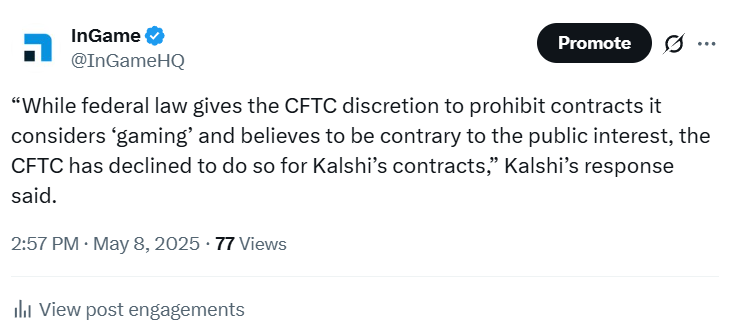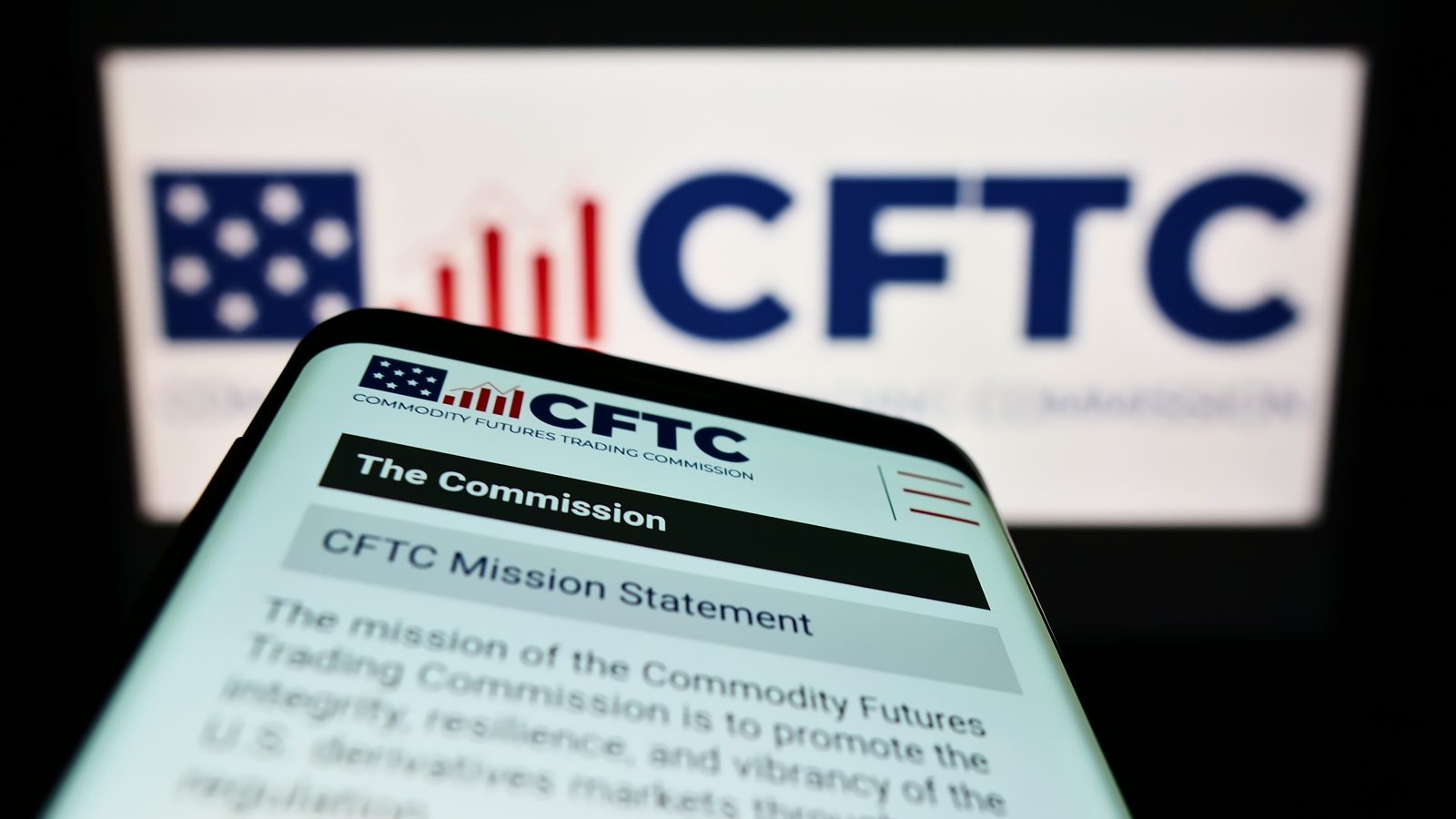The Commodity Futures Trading Commission (CFTC) addressed sports event contracts for the first time in a new letter in which the commission notes that it has still not made a decision about whether the contracts are a prohibited product.
The letter, published Tuesday evening, was addressed to Futures Commission Merchants (FCMs), Introducing Brokers (IBs), Designated Contract Markets (DCMs), Derivatives Clearing Organizations (DCOs), and Registered Futures Associations (RFAs).
25-36-4In the world of sports event contracts, DCMs — exchanges that create and host markets, such as Kalshi — and FCMs — organizations like Robinhood that allow their users to access markets offered by a DCM — are the most relevant players.
CFTC-registered firms have been able to list event contracts related to sports via self-certification, a process in which a designated contract market notifies the commission that it plans to list a new type of market. If the CFTC doesn’t step in to review or block the market, it may be offered, although it is not technically considered “approved.”
Kalshi and Crypto.com — both DCMs — have offered sports event contracts in this manner since January, with Kalshi in particular offering an ever-widening array of sports markets, which now includes parlays. In recent days, Polymarket — which hasn’t yet launched its U.S. site but is expected to do so soon — and ForecastEx also self-certified to offer sports contracts. Because self-certification does not require any sort of action from the CFTC, the regulator never made any direct comments about its views on sports contracts, even as registered firms listed them to customers.
The letter marks the first time that the CFTC has spoken about sports contracts directly since registered firms began offering the products. However, it does not offer much in terms of specifics of the regulator’s stance on these contracts.
CFTC references state-by-state information
The letter was published just ahead of the government shutdown that began Tuesday, which will force the CFTC to operate with a further-reduced workforce, after job cuts and commissioner resignations earlier this year. It appears to have been published in order to prepare for the scenario that the status of sports event contracts changes while a shutdown is ongoing, in which case the CFTC may not be able to offer up-to-date guidance to regulated firms as easily.
The letter says that the CFTC is “aware” both of the contracts themselves — which it regulates — and “various forms of State regulatory actions and pending and potential litigation concerning the legality of sports-related event contracts.”
The contracts have been controversial, as a number of state regulators and attorneys general have argued that they are a form of illegal gambling. Kalshi is currently engaged in lawsuits against the states of Nevada, New Jersey, Maryland, and Massachusetts over the legality of its sports contracts.
It said that these regulatory actions should be “accounted for” via “contingency planning, disclosures, and risk management policies.”
The CFTC said that regulated firms should provide customers “with regularly updated information, including information based on any states in which they operate or engage in activity, to ensure that such customers, market participants, and clearing members understand the possible effects should State regulatory actions or ongoing or new litigation, including enforcement actions, result in termination of sports-related event contract positions.”
The reference to “information based on any states in which they operate” has been interpreted by some as a suggestion that the CFTC may be more lenient about its requirement for “impartial access” to markets than Kalshi has suggested in its lawsuits with states that have attempted to have its sports contracts shut down. Kalshi lawyers have said that it is not possible for a DCM to only offer contracts in some states without violating CFTC rules, and thus attempting to shut down the contracts in even one state would cause “irreparable harm.”
It is worth noting that the “impartial access” requirement applies only to DCMs. Robinhood, as an FCM, currently does not offer its sports event contracts in Maryland.
May not be make-or-break for Kalshi lawsuits
But even if “impartial access” requirements are flexible with regard to differing state-by-state rules, that may not be a major setback for Kalshi’s legal arguments, Andrew Kim, a partner at Goodwin Law, said.
“The impartial-access argument has always been just one of many Kalshi arguments for irreparable harm,” he told InGame. “The most compelling piece of that argument is that geofencing would expose Kalshi to potential violations of the Core Principles. The CFTC staff advisory may undermine that notion, but it doesn’t directly contradict it.
“Kalshi has also made other arguments about irreparable harm, independent of geofencing/market access. Two arguments come to mind. First, the reputational harm associated with a criminal prosecution or civil enforcement action. Second, the fact that Kalshi can’t sue the state to recover lost business revenues or the costs of erecting temporary geofencing, given the state’s sovereign immunity.
“Both of those arguments have always struck me as stronger than the geofencing/market access arguments. And the CFTC’s staff advisory doesn’t undercut those arguments.
“That said, Kalshi has made its irreparable harm arguments different ways in different cases, leaning more on market access in some cases (Maryland) than in others (New Jersey). Where Kalshi has leaned on the argument more heavily, the advisory could have more of an impact.”
More clues on CFTC stance in footnotes
The footnotes to the letter offer some further information on the CFTC’s sports event contracts stance. In one, the CFTC says “the Commission has not, to date, made a determination regarding whether any such contracts involve an activity enumerated or prohibited” under the Commodity Exchange Act (CEA) or the CFTC’s own regulations.
That line emphasizes the currently uncertain regulatory ground on which sports event contracts sit.
Lawyers for Kalshi have argued that states cannot shut down sports event contracts, as it says only the CFTC has jurisdiction over the products offered by DCMs.
But that same jurisdiction would mean that if the CFTC believed the contracts should be prohibited, avenues for recourse could be slim. While Kalshi sued the CFTC last year when it blocked the exchange from issuing event contracts on elections, the Commission’s discretion to block sprots event contracts, if it chooses to do so, would appear clearer.
The CEA says that “the Commission may determine that such agreements, contracts, or transactions are contrary to the public interest if the agreements, contracts, or transactions involve” gaming, war, assassination, terrorism, or illegal activity.
Kalshi’s lawyers point to the word “may” in that law, as opposed to a stronger word like “shall,” as proof that the law allows prediction markets to offer gaming as long as it’s within the public interest.
The CFTC’s rules say that a DCM “shall not list for trading” a contract that is “based upon an excluded commodity,” as defined in the above section of the CEA, “that involves, relates to, or references terrorism, assassination, war, gaming, or an activity that is unlawful.”
Again, Kalshi’s interpretation of the law involves a “two-part” test, arguing that an “excluded commodity” refers to a contract that doesn’t just involve terrorism, assassination, war, or gaming, but also is against the public interest.

The footnotes also reference lines in the CFTC regulations that suggest the commission’s interpretation may be less of a two-part test than Kalshi has argued. One footnote cites lines in the Federal Register — where proposed and final regulations from government agencies are announced — that says “[T]he Commission ‘needs the power to, and should, prevent derivatives contracts that are contrary to the public interest because they exist predominantly to enable gambling through supposed event contracts.’”
If this is the CFTC’s interpretation of the law then it may not believe in a two-part test, and therefore may solely be waiting for determination of whether the contracts are “gaming.” If so, that would open up the possibility that the CFTC could rule that the contracts are prohibited even if courts agree with Kalshi’s argument that states do not have the jurisdiction to shut them down.
New CFTC chair could be pivotal
However, the CFTC’s current interpretation of the contracts could be made moot by the fact that its only current commissioner — acting chair Caroline Pham — will exit when a new chair is appointed. That new leader of the CFTC could share Kalshi’s view that gaming contracts are permitted.
In fact, the next chair could even be Kalshi lawyer Josh Sterling, who according to a report last week is being vetted by the White House for the role. Sterling has laid out the legal case for the two-part test while representing the prediction market.
With the other four commissioners having left their roles this year, a new chair would be able to exert an unusually high level of influence over the direction of the CFTC and its stance towards sports event contracts.
Originally, Brian Quintenz — a Kalshi director and shareholder — was set to be the new CFTC chair, having been nominated by President Trump. However, his nomination stalled and was officially withdrawn Monday.






